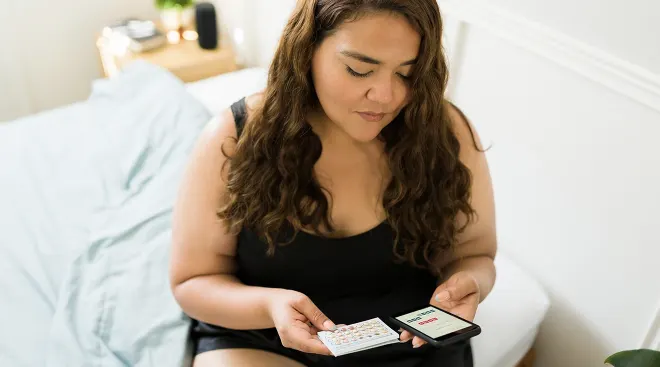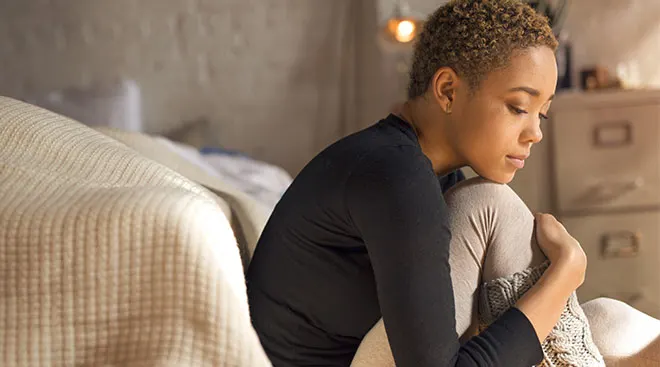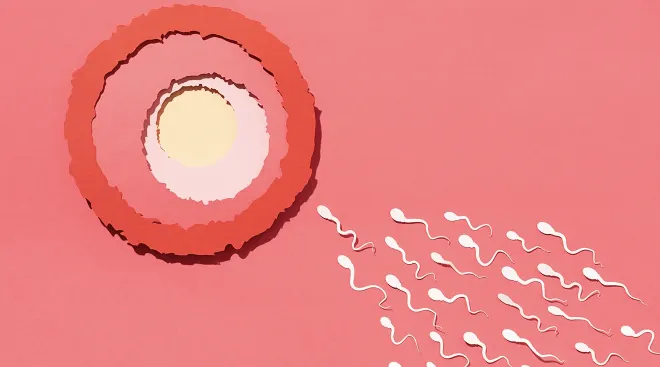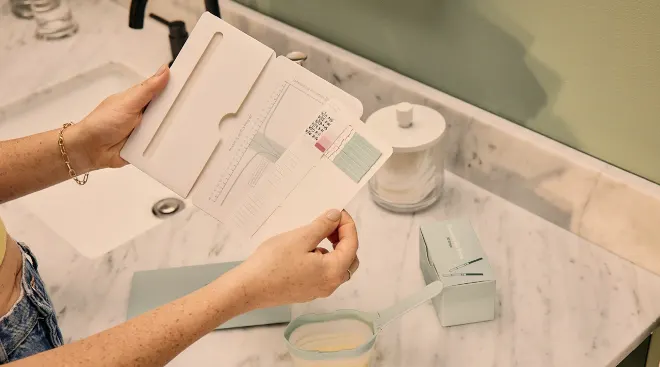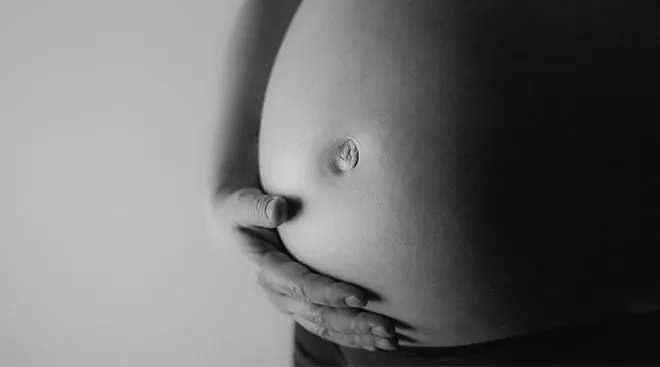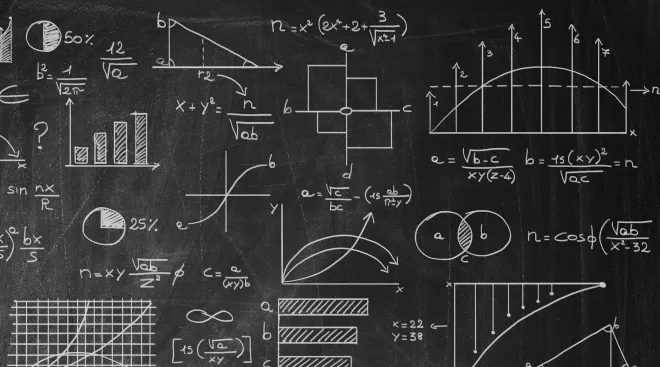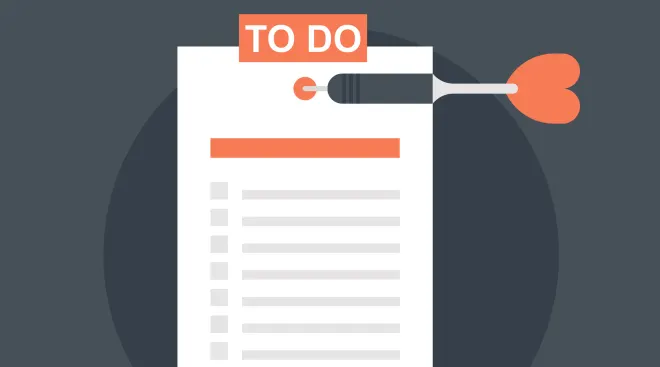Can You Get Pregnant on Your Period?
Can you get pregnant on your period? It’s a common question many people ask at one point or another, whether they’re hoping to have a baby or trying to avoid pregnancy altogether. The answer isn’t exactly clear-cut, given how confusing the timing of ovulation can be. So what’s the deal—and what are the odds of this happening? We reached out to experts to find out, once and for all, if getting pregnant on your period—or immediately before or after—is even a remote possibility, and how to figure out when you’re most and least fertile.
While extremely unlikely, it is technically possible to get pregnant on your period. So, how can you get pregnant on your period? It depends on several factors, including the length of your menstrual cycle, when you ovulate and the amount of time the sperm survives.
Why is getting pregnant on your period relatively rare? It’s all a matter of simple math. Depending on when during your period you have sex, you’ll likely have at least seven days until you ovulate. It’s not likely the sperm will survive that long, which is why “a woman with a regular menstrual cycle will not get pregnant on her period,” says Fahimeh Sasan, DO, founding ob-gyn of Kindbody, a fertility and family-building clinic in New York City.
But here’s the snag: If you happen to have very long periods (i.e. more than five days) but very short menstrual cycles (i.e. less than 24 days between periods), you could get pregnant if bleeding happens to take place during the time of ovulation. “If you have a 21-day cycle, you’d likely ovulate around day seven. And if you’re still on your period by day seven, it may be possible to get pregnant,” explains Megan Cheney, MD, MPH, obstetrics and gynecology clerkship director at the Mayo Clinic College of Medicine Arizona.
Of course, not all vaginal bleeding is caused by your period. While the likelihood of getting pregnant on your period is extremely low if you have a regular cycle, this isn’t necessarily the case if you’re bleeding for other reasons. Some women have episodes of spotting between their periods, or even bleed (lightly) during ovulation; they may assume they’re on their period, when, in fact, it’s their most fertile time of the month. (One useful clue: The blood you see during ovulation will either be light pink or brown, rather than the dark red of your period.) That’s why it’s important to know your own unique menstrual patterns, Sasan says. For women with irregular menstrual cycles, the lack of consistency can make it difficult to time intercourse for conception (or the avoidance of it). For this reason, it’s especially important to use contraception if you don’t want to get pregnant. If you’re actively trying for baby, speak with your doctor about how to best predict your fertile window and manage irregular cycles.
Can you get pregnant the first day of your period?
It’s extremely unlikely to conceive on the first day of your period, even during the shortest of normal menstrual cycles, says Eric Flisser, MD, an ob-gyn and reproductive endocrinologist in New York City. Plus, since sperm is only viable for a few days, there’s a decreasing possibility of pregnancy the further unprotected sex occurs from ovulation. There may be a slight chance of pregnancy from sex on the last day of your period, since sperm may still be present at the start of ovulation, but again, this is also pretty unlikely and depends on how long your cycle is and how long the sperm survives.
Can you get pregnant on your period on birth control?
While birth control is not infallible, if you’re taking it correctly, it’s nearly impossible to get pregnant on your period on birth control, says Cynthia Flynn, MD, an ob-gyn. “If you take the pill as directed, the chance of pregnancy is less than 1 in 100.”
It’s way harder to get pregnant on your period than when you’re not—but can you get pregnant right after your period? It depends on what you mean by “right after.”
How many days after your period can you get pregnant?
You generally can’t get pregnant within one day after your period ends, says Jaime Knopman, MD, a fertility specialist in New York City. The only exception? “If you have a very short cycle and long bleeding periods,” she adds. In that case, if you bleed until day seven, have sex on day eight and ovulate on day nine or 10, it’s possible to become pregnant.
For women with normal cycles, though, the chances of getting pregnant start to increase only as you get closer and closer to your fertile window. Again, most women ovulate between day 12 and day 21 of their cycles—so if you have sex just two days after your period ends (say, on day seven), you’re only five days away from ovulation. So if you happen to have robust sperm swimming around—the ones that can last five days—there’s a chance you could get pregnant.
So what are the chances of conception just before you menstruate? Can you get pregnant the day before your period? The closer you are to getting your period when you have sex, the less likely it is that you’ll get pregnant. That’s because it puts you further away from ovulation, and the egg is viable for only 12 to 24 hours after ovulation. The number of “safe days” right before your period will increase with longer cycles and decrease with shorter cycles. For women with a regular cycle, having unprotected sex the day before your period is extremely unlikely to result in a pregnancy—“almost zero chance,” says Sasan.
Bottom line: It’s very hard to get pregnant on your period—almost impossible. So when can you get pregnant? Your best bet is leading up to and during ovulation. Since the egg is viable for only 12 to 24 hours after ovulation, it has to be fertilized by sperm before that time is up. Remember, sperm can live in your body for up to five days (though three days is more common), so it’s possible to have sex before you ovulate and still conceive a few days later. Again, that means you may be fertile for the five days leading up to ovulation and up to 24 hours after. But if you wait 36 to 48 hours after ovulation to have sex, you’ll be beyond your window of fertility.
Keep in mind, it’s not unusual to take several tries before becoming pregnant. Often, both egg and sperm are available, but fertilization just doesn’t happen. One study, involving women with an average age of 29, found that the odds of getting pregnant within the first month of properly timed sex is around 38 percent; that figure shot up to 68 percent after three months, and 92 percent after a year. In other words, don’t worry if it takes time. To that end, the American College of Obstetricians and Gynecologists (ACOG) recommends that those under 35 seek fertility help after a year of trying; if you’re between 35 and 40, reach out to your doctor after six months to discuss next steps. Women 40+ should consult their providers for personalized guidance.
Frequently Asked Questions
At what point in your cycle are you most likely to get pregnant?
After the egg is released during ovulation, it moves on to the fallopian tube, where it typically survives for 12 to 24 hours. There, it can meet up with any available sperm, which can live in a woman’s body for about three to five days. According to ACOG, unprotected sex anywhere from five days before ovulation until one day after could result in pregnancy. That’s why you’re considered most fertile the day of ovulation and the five days leading up to it.
At what point in your cycle are you least likely to get pregnant?
You’re least likely to get pregnant during your period and a few days before your period, says Christine Greves, MD, FACOG, an ob-gyn at the Winnie Palmer Hospital for Women & Babies in Orlando. While your ovulation timeline can fluctuate, menstruation follows a more predictable pattern. Healthy women get their periods 12 to 14 days after ovulation if the egg isn’t fertilized, Knopman says. On average, bleeding can last for two to seven days. (Keep in mind that these are just estimates based on averages; every person’s cycle will vary based on their individual circumstances.)
So is it possible to get pregnant on your period? Yes. It is likely? No. Whether you’re in family planning mode or trying to avoid getting pregnant at the moment, it’s important to understand the timing of your individual cycle and track your ovulation—either with menstrual charting, an ovulation predictor kit or by checking your basal body temperature—to help you make informed decisions about when to have sex.
Please note: The Bump and the materials and information it contains are not intended to, and do not constitute, medical or other health advice or diagnosis and should not be used as such. You should always consult with a qualified physician or health professional about your specific circumstances.
Plus, more from The Bump:
Megan Cheney, MD, MPH, is a board-certified gynecologist and clinical instructor at Mayo Clinic Arizona. She’s also the obstetrics and gynecology associate clerkship director for the Mayo Clinic College of Medicine Arizona. She treats a wide range of conditions, including abnormal uterine bleeding, ovarian cysts and endometrial polyps. She earned her medical degree and master’s in public health from University of Arizona College of Medicine — Tucson.
Eric Flisser, MD, is an ob-gyn, reproductive endocrinologist and infertility specialist at RMA of New York. He also serves as an assistant clinical professor in the Department of Obstetrics, Gynecology and Reproductive Science at Mount Sinai’s Icahn School of Medicine. He earned his medical degree from New York University School of Medicine and completed his ob-gyn residency at New York-Presbyterian Hospital.
Cynthia Flynn, MD, is a board-certified ob-gyn with over 30 years of experience. She received her degree from the Michigan State University College of Human Medicine.
Christine Greves, MD, FACOG, is an ob-gyn at the Winnie Palmer Hospital for Women & Babies in Orlando. She received her medical degree from the University of South Florida College of Medicine.
Jaime Knopman, MD, is a board-certified reproductive endocrinologist and serves as the director of fertility preservation for CCRM Fertility in New York City. She received her medical degree from Mount Sinai School of Medicine.
Fahimeh Sasan, DO, is the founding ob-gyn of Kindbody, a fertility and family-building clinic in New York City. She completed her doctorate of osteopathic medicine at the University of North Texas in 2006.
American Pregnancy Association, What Is Ovulation?
Frontiers in Global Women’s Health, Chronic Stress and Ovulatory Dysfunction: Implications in Times of COVID-19, May 2022
US Department of Health and Human Services, Office on Women’s Health, Weight, Fertility, and Pregnancy, February 2021
Mayo Clinic, Female Fertility: When Lifestyle Choices Count, December 2022
American College of Obstetricians and Gynecologists, Fertility Awareness Methods of Family Planning, August 2022
American College of Obstetricians and Gynecologists, Trying to Get Pregnant? Here’s When to Have Sex, August 2023
Mayo Clinic, Menstrual Cycle: What’s Normal, What’s Not, April 2023
UpToDate, Abnormal Uterine Bleeding (Beyond the Basics), July 2022
Mayo Clinic, How Long Do Sperm Live After Ejaculation?, May 2022
Human Reproduction, Time to Pregnancy: Results of the German Prospective Study and Impact on the Management of Infertility, September 2003
American College of Obstetricians and Gynecologists, Evaluating Infertility, August 2022
Learn how we ensure the accuracy of our content through our editorial and medical review process.
Navigate forward to interact with the calendar and select a date. Press the question mark key to get the keyboard shortcuts for changing dates.




































